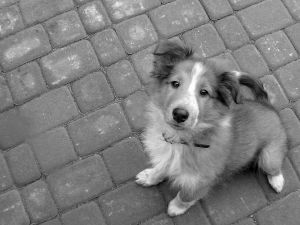Why do some dogs ignore their owners daily…
but then seem to bond with a skilled dog trainer in seconds, and listen attentively to that trainer forever?
Hint: It’s a matter of repetition, but not the kind you might think.

"You called? I'm listening!" Attention and eye contact like this are a rare experience for many dog owners unless it's dinner time.
Repetition can be a bad thing. Many dog owners accidentally teach their dogs to ignore the most important cues they want their dogs to listen to! This will happen when you repeat the same communication over and over, without any specific consequence attached. The science of how the brain works tells us that when a signal is repeated over and over with no meaning attached – it will become background noise. Here’s an example I always give when teaching dog training classes in NYC: If you live in a city apartment, you pay no attention to wailing sirens that pass by your window every day. If you just moved here from a rural environment then maybe you notice them for the first few days. But after that, you’ve heard them so much – with no consequence to you personally – that your brain literally “tunes them out”. Don’t become a wailing siren to your dog!
A classic example of repetition without meaning…
is experienced by many dogs when they are called to Come by command, or by name. Let’s look at some common ways that owners inadvertently teach their dogs to ignore their name:
- Your command is repeated over and over when the dog is more motivated by something else (e.g., squirrels) and would never possibly listen
- Your dog comes running when called but the behavior never leads to anything rewarding (no consequence)
- Your dog runs back to you and then gets punished (you immediately put on the leash and go home – wrong consequence!)
 Another common example of a word that gets ignored is “No”. Let’s look at the ways that repeating this word turns it into background noise:
Another common example of a word that gets ignored is “No”. Let’s look at the ways that repeating this word turns it into background noise:- You say “no” over and over while you let a puppy continue to bite your hand or play tug with a pair of pants (while you’re wearing them)
- You say “no” while you chase a dog all over the house after he’s stolen something (you’re actually turning “no” into a game)
Most dog owners mean well, but they just don’t realize that…
Why do dogs pay close attention to trainers right away?
As a private lessons trainer, I have gone into many homes where the dogs have completely tuned their owners out. The owner will say, “he doesn’t listen to anyone.” But, then the dog and I hit it off very quickly. Dogs can quickly size up a person and when they see that trainers are clear and consistent in their communication they love it! Imagine if you were at a huge party full of people that spoke a different language from you. Everyone you tried to talk to looks at you funny and says some jibberish back. Then, all of a sudden you find someone who speaks your language. Would you want to talk to him? That’s how dogs feel when they meet a trainer. “Thank goodness! Party time!”
Is this magic? No. It can be boiled down to good communication. Compared to a typical dog owner, a good trainer won’t repeat cues. We will say it once or twice and then look for understanding before “wasting” the cue again. Trainers also attach consistent consequences to their communication, with excellent timing. Trainers say something, then watch the dog, and then respond accordingly. Or if they want to “explain” what a word means right away, they will act on it right after saying it. For example, if a dog is about to pick up a saucy knife I just dropped on the floor, I might say “No!” and step quickly into his space with a body block. This “explains” what No means. Compare that to a sing-songy sequence of “Noo”, “Nooo”, “Nooooo”, that I hear many new puppy owners chant to their pup as she chews their hands off. I call this the No Song. Don’t sing the No Song!
The Wrap: Here’s how you “talk dog” like a trainer: Don’t repeat words over and over. Attach consequences to your communication (rewards or penalties, mostly rewards). Use good timing. Be consistent.
~
If this post sparks questions for you, post them on our Facebook page. We’d be happy to hear from you and answer your questions!
Like us on Facebook
Follow us on Twitter
Can’t get enough of learning about dogs? Check Out Our School for Aspiring Dog Trainers






 Phone:
Phone:
[…] Instituto Perro, Training Tracks, Catch, Dogington […]
Thank you. I have been having the hardest time training my dog and I’ve unfortunately tried all the negative consequences (first time dog owner and simply took everyone else’s advice) I plan on implementing this is into our lives starting this coming morning. I really needed to hear this. I knew i/my husband were the problem but I didn’t know why. This probably won’t solve everything, but it’s a start! Thanks again for posting this.
That actually makes sense, thank you. However I have one question, how do you reprimanded a dog for failing to return on the come command. I have never been a punisher, as I won’t hit or strike him,so what can I do for not listening? Thanks, Dana
Hi Dana, Check out these other two articles on the blog about coming when called. They will address your question and more: https://catchdogtrainers.com/why-wont-my-dog-come-2012-12-19/ https://catchdogtrainers.com/catch-tip-of-the-day-dont-ruin-your-recall-2012-02-16/
That actually makes sense, thank you. However I have one question, how do you reprimanded a dog for failing to return on the come command. I have never been a punisher, as I won’t hit or strike him,so what can I do for not listening? Thanks, Dana
Hi their I have a 7 month old chihuahua male, that chases and barks at my cats can you please give me some advice as to how Can I stop it
Hi Bridget, It is instinctive for dogs to be excited by other animals and to want to chase them. There could also be issues where one or both of the animals are worried about close contact with one another, in which case there may be defensive behaviors. Either way, there is no “quick fix” for this issue and a pro should see it firsthand to help you. For a start, you can try keeping your Chi on a leash in the house and gently guide him away in the presence of the cat. Reward him for behaviors you like such as NOT barking, turning towards you, or coming to you in the presence of the cat. There are all kinds of training exercises you can do to strengthen those behaviors and your dog’s impulse control overall. I would work with a private trainer on these issues. Check out apdt.com, dog trainer search, to find reward based trainers in your area. Warmly, David and the Team at CATCH
[…] In fact, it’s been proven scientifically. When a signal is repeated over and over with no meaning attached, it becomes background noise. […]
[…] Why Does My Dog Ignore Me? | Catch Canine Trainers Academy […]
[…] they are also independent and strong-headed, you may find that sometimes, they do not respond to particular commands. Although this may frustrate you, you may find out that something else has caught its attention. […]
How do you give a dog a time out? How does the dog understand that the time out is related to its behavior?
In this case a “time out” means you immediately stop making the current activity “fun” by stopping the “game”. For example, if you are playing with a dog but they keep mouthing your skin or grabbing your clothing, you want to stop the activity to take away the rewarding action. Sometimes that means you just stop, break eye contact, and “be a tree”. Other times it may mean walking away completely and waiting until the dog calms down, then re-engage but direct the dog to the appropriate toy or action. This isn’t always easy for a novice dog owner. If you need some in-person guidance, having a pro trainer on your side can certainly help.
[…] training tips for disobedient dogs but still have problems, it’s time to get help from a pro24. Many dogs ignore commands 50% of the time, like when they see squirrels or other […]